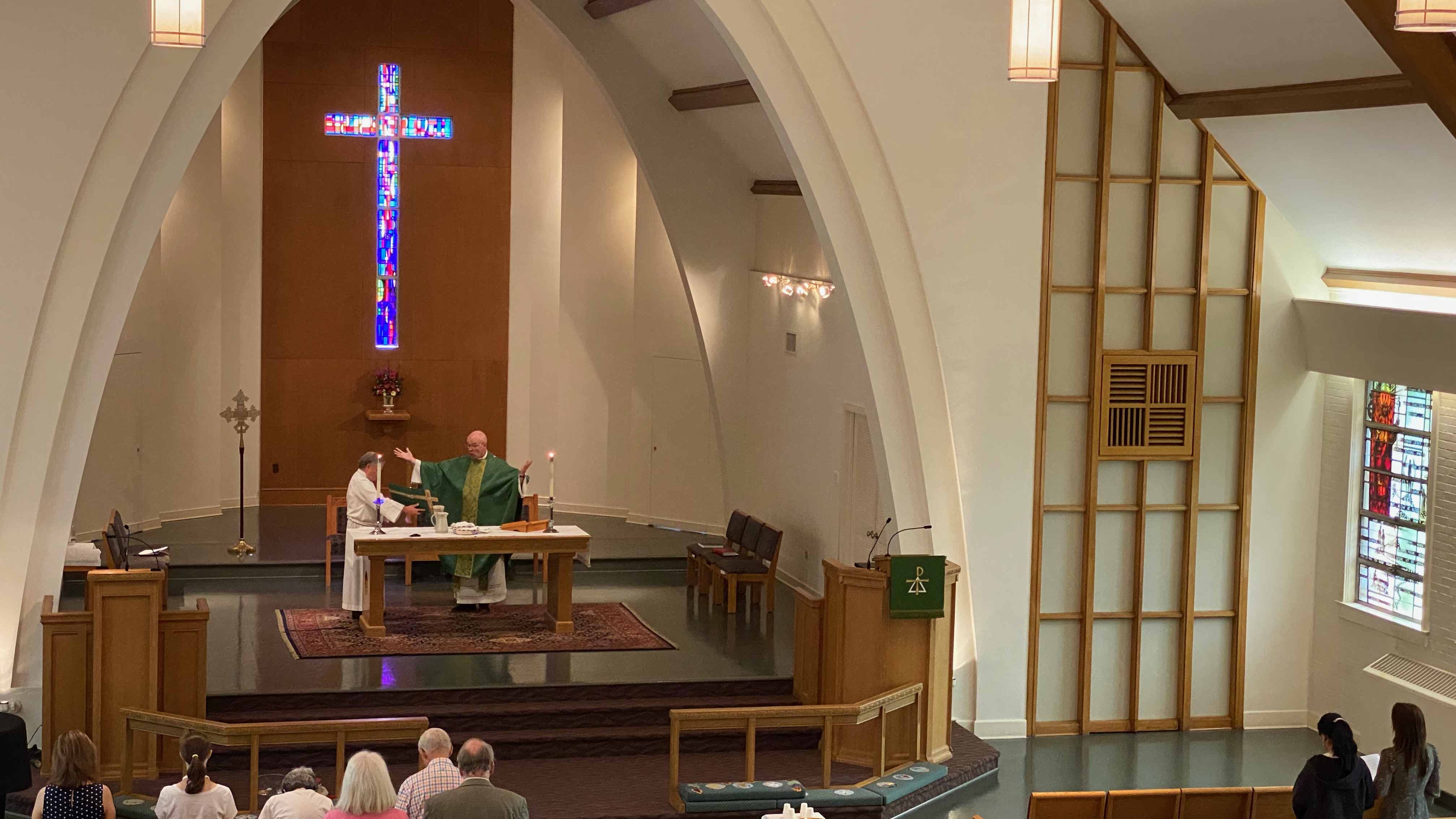Week of the Thirteenth Sunday after Pentecost
Dear Friends in Christ:
Despite the fact that he was not able to join us on Sunday, I nonetheless am moved to share with you the sermon which the Rev. Lowell Almen, former Secretary of the ELCA, intended to preach among us this past Sunday morning. Drawing on long and abiding associations with and deep respect for the clergy who serve as military chaplains, Pastor Almen relates poignant stories and experiences to Sunday’s second reading from Ephesians concerning our being clothed with the full armor of God.
Many thanks to Lowell for his willingness to offer to us his sermonic recounting and reflections. May God bless you in the reading of this proclamation.
Pastor Jonathan Linman
“From Down Range to New Hope”
For Resurrection Lutheran Church, Arlington, Virginia
By the Rev. Lowell G. Almen
Copyright ©️ 2021
Hear again from Ephesians, the sixth chapter: “Be strong in the Lord and in the strength of the Lord’s power. Put on the whole armor of God…, so that you may be…ready to proclaim the gospel of peace. Pray in the Spirit at all times in every prayer and supplication. To that end keep alert and always persevere in supplication for all the saints.”
I had just arrived at Ramstein Air Force Base in Germany. Command Chaplain Gary Garvey was giving me a brief tour of the base. He served for a quarter century as an Air Force chaplain.
Throughout the 20 years that I served as the ELCA’s first secretary, I met with the Lutheran military chaplains at their annual conference. I found them to be an amazing, dedicated group of pastors – pastors focused clearly on the work that they had been called by the church to carry out as chaplains.
At one of those conferences, Chaplain Garvey told me he had just been assigned as command chaplain at Ramstein. He urged me – sometime when I would be in Europe for ecumenical meetings – … he urged me to add a couple of days to the trip to visit Ramstein. I was able to accept that invitation in late August 2005 – 16 years ago this coming week.
When Chaplain Garvey was giving me a tour of Ramstein, there was a sudden change in plans. He received notice that a plane was coming in with wounded from “down range” – in that case from Iraq. The driver turned the van in the direction of the airfield to meet the plane.
The C-17 Medevac aircraft taxied to a stop on the tarmac. The plane’s side door opened quickly. Chaplain Garvey stepped onboard. I followed him. What I saw amazed me: Stretchers stacked four deep in two rows down the center of that large transport plane. Walking wounded filled the side benches the length of the plane.
Chaplain Garvey greeted individually each of the wounded on the stretches. Then he helped carry the stretchers to awaiting vehicles. Soon, they would be on their way to the nearby Landstuhl Hospital. There they would be evaluated. Some would be treated at Landstuhl. Others would be prepared for flights to Walter Reed here in Washington, D.C.; others would be sent to facilities in San Antonio.
I learned that each Medevac flight – sometimes six or seven or more a day – was met by a chaplain. That pattern had been started in late 2004. It began as the fighting in Iraq became intense, especially in the 2004 Battle for Fallujah.
As some may remember, Fallujah is a strategic city in Iraq that is located about 40 miles west of Baghdad. During the early days of the Iraq War, the fight for that city began in the spring of 2004. In months of ferocious house-to-house fighting against well-armed insurgents, many Marines were killed. Many, many more were gravely wounded. By the time the planes with those wounded Marines from Fallujah were arriving in Ramstein in 2004, the wounded would be regaining conscientious. They had been put into a drug-induced sleep at the start of the flight. In their intense pain and confusion as they awoke on the plane, they would strike out and fight the medical personnel tending to them. Amid their fog of pain and medication, they were terrified. Some thought they had been captured by the enemy. They did not know where they were. But one day when a chaplain who happened to be at the airfield stepped onto the plane, a discovery was made. The wounded on the plane became quiet. They settled down. They knew they were safe. How? They saw the cross on the chaplain’s uniform. By the sign of the cross, they realized that they were in safe hands. By the sign of the cross, they understood that they were with people ready to care for them.
Many times a day during the Iraq War, C-17 Medevac planes would land at Ramstein – day and night. The planes were carrying wounded from the Army, Air Force, Navy, and Marines. Sometimes there even would be wounded civilian contractors on board.
Throughout the years of continuing battles in Iraq and Afghanistan, thousands upon thousands of wounded arrived at Ramstein. Awaiting on the tarmac for each plane was a chaplain – a chaplain ready to climb on board as a symbol of hope and compassion.
Those soldiers that I saw that day in August 2005 were all on a journey, a journey from downrange to new hope – a journey with the help of chaplains, medical doctors, health-care workers, stretcher bearers, and others. And, by the sign of the cross, the church was there through the presence of the chaplains.
Most of us have not experienced what those Marines faced in the Battle of Fallujah. Most – perhaps all of us – never will. But we face our own challenges and struggles – some deep within us, others maybe around us. We, too, can be reassured by the sign of the cross. That sign means God is at work in us. God is at work bringing reconciliation amid division. God is at work bringing healing amid pain. God is at work bringing hope amid discouragement.
In many ways, we have our own journeys from down range to new hope. For those journeys, today’s reading from Ephesians offers guidance.
The Letter to the congregation at Ephesus is attributed to St. Paul. But it actually was written about a quarter century after St. Paul’s martyrdom along the Appian Way just south of Rome. The writer clearly knew of Paul’s actual writings. Indeed, the writer echoes Paul’s profound sense of the church … Paul’s conviction of our unity in Christ reflected throughout the whole community of faith.
Ephesus at that time was an important city of commerce. Roads into and out of the city were active with traffic for goods. And the place had a significant seaport for shipping throughout the Mediterranean.
But a difficult time of persecution was underway. Those believers at Ephesus were called to battle –battle against the forces of evil … battle against the threats to the church’s unity … battle against all that would threaten them in the journey of faith.
Thus, we have that image of military equipment:
- Put on the whole armor of God…
- Be strong. Be strong in the Lord…
- Keep alert…
- Carry the breastplate – the protective armor – of righteousness…
- Fasten on the belt of saving truth…
- Take the shield of faith…
- Put on the helmet of salvation…
- And pray … pray not only for yourselves but pray for all of the saints … all those joined together in the church throughout earth and heaven.
Our journey from whatever is down range for us to new hope is always one of confession and faith. As we heard the Apostle Peter declare in today’s Gospel: “Lord, to whom shall be go? You have the words of eternal life.”
Under the sign of the cross, we move from down range to new hope.
Copyright ©️ 2021






